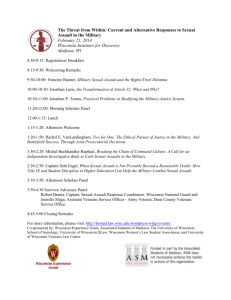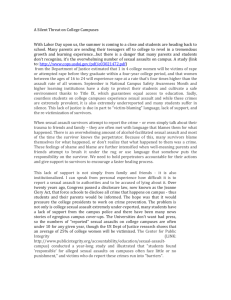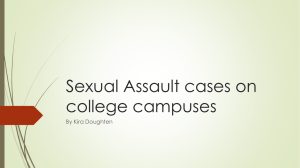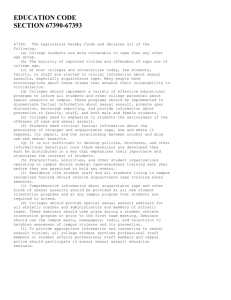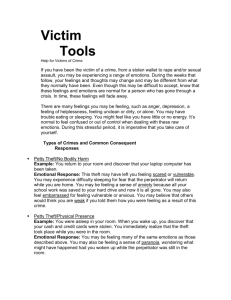Embargoed: For release at 12:01 a.m. CT Sunday, Feb. 28, 2010
advertisement
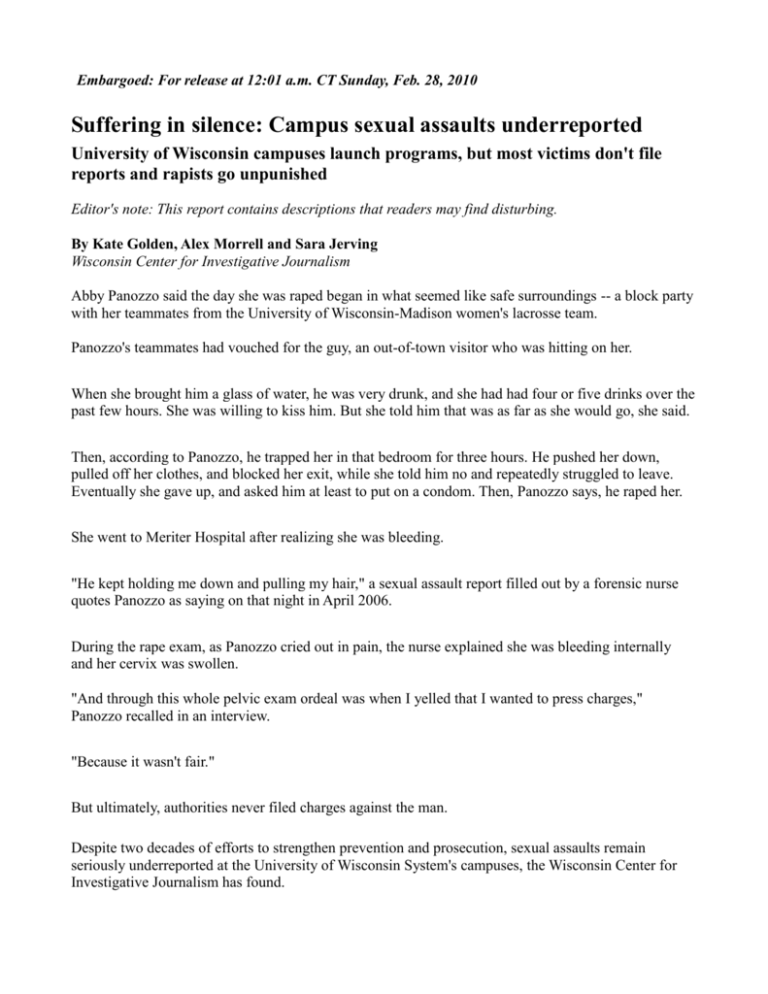
Embargoed: For release at 12:01 a.m. CT Sunday, Feb. 28, 2010 Suffering in silence: Campus sexual assaults underreported University of Wisconsin campuses launch programs, but most victims don't file reports and rapists go unpunished Editor's note: This report contains descriptions that readers may find disturbing. By Kate Golden, Alex Morrell and Sara Jerving Wisconsin Center for Investigative Journalism Abby Panozzo said the day she was raped began in what seemed like safe surroundings -- a block party with her teammates from the University of Wisconsin-Madison women's lacrosse team. Panozzo's teammates had vouched for the guy, an out-of-town visitor who was hitting on her. When she brought him a glass of water, he was very drunk, and she had had four or five drinks over the past few hours. She was willing to kiss him. But she told him that was as far as she would go, she said. Then, according to Panozzo, he trapped her in that bedroom for three hours. He pushed her down, pulled off her clothes, and blocked her exit, while she told him no and repeatedly struggled to leave. Eventually she gave up, and asked him at least to put on a condom. Then, Panozzo says, he raped her. She went to Meriter Hospital after realizing she was bleeding. "He kept holding me down and pulling my hair," a sexual assault report filled out by a forensic nurse quotes Panozzo as saying on that night in April 2006. During the rape exam, as Panozzo cried out in pain, the nurse explained she was bleeding internally and her cervix was swollen. "And through this whole pelvic exam ordeal was when I yelled that I wanted to press charges," Panozzo recalled in an interview. "Because it wasn't fair." But ultimately, authorities never filed charges against the man. Despite two decades of efforts to strengthen prevention and prosecution, sexual assaults remain seriously underreported at the University of Wisconsin System's campuses, the Wisconsin Center for Investigative Journalism has found. A review of records, and interviews with victims, advocates and administrators at the University of Wisconsin System's 13 four-year campuses show: The estimated number of rapes outnumbers reports of sexual assaults on UW System campuses and at the flagship UW-Madison by a margin of 17-1. With reporting levels so low, nearly all rapists go unpunished, whether by schools or the criminal justice system. Victims still face barriers to reporting their assaults, including a fear that the experience will leave them feeling victimized again. Wisconsin takes the relatively unusual step of requiring the university system to file an annual report on sexual assaults with the Legislature. Copies of the report, though discussed at public Board of Regents meetings and sent to the Legislature, were not readily available to the public in recent years. The Wisconsin Center for Investigative Journalism obtained reports through a public records request. But on Tuesday, in response to the Center's reporting, UW officials acknowledged the reports should be more accessible, so they posted them on a new Web page. Recent changes in the University of Wisconsin System's procedures for addressing sexual assaults are controversial. Some experts say it may become easier to punish rapists, while others worry that one change could intimidate victims. Because few rapists ever are formally accused, it is hard to determine the impacts of the revisions. Campuses have ramped up prevention programs. However, their effectiveness is unclear and on some campuses, funding relies upon unstable grants. Similar problems regarding sexual assaults at campuses across the nation are detailed in a year-long project led by the Center for Public Integrity, a nonprofit investigative journalism organization based in Washington, D.C. The latest stories, released last week, said students responsible for rapes rarely are held accountable while their victims' lives are disrupted, federal watchdog efforts are weak and school administrators nationwide often are slow to realize they have serial rapists in their midst. The Wisconsin Center for Investigative Journalism collaborated on this project with the Center for Public Integrity and investigative journalism centers in Colorado, Washington state, Texas and Massachusetts. 'Sexual assault is literally epidemic' How many rapes or attempted rapes are occurring on Wisconsin campuses? National surveys of college women are the most accurate way to estimate campus rape, researchers say. An oft-cited federal National Institute of Justice study in 2000 estimated 35 rapes per 1,000 students each academic year. For the UW System, with about 94,700 female students in 2008, that translates to about 3,300 rapes per school year. And that's not including male victims; a 2003 U.S. Department of Justice study estimated that 1 in 10 rape victims was male. The System's most detailed report lists 188 sexual assaults in 2008 -- and that's including all rapes or attempted rapes, plus less severe forms of sexual assault, such as sexual contact without consent. At a school the size of UW-Madison, with about 21,600 women in 2008, national statistics suggest there could be 750 rapes or attempted rapes a year. The school's most detailed report shows 44 sexual assaults in 2008. Most were off-campus and involved acquaintances, not strangers. Experts interviewed by the Center said there is no reason to believe sexual assaults in Wisconsin are lower than the figures cited by national surveys. In fact, the UW System's annual report to the Legislature cites those estimates. "These numbers here don't even begin to touch on the reality of the situation," said Rep. Joe Parisi, DMadison, who chairs a key Assembly committee that oversees sexual assault legislation. "Sexual assault is literally epidemic in our society, and especially among younger women." When rape victims talk to each other they feel less alone. But word gets around about how victims are faring in the system, Panozzo and others said. This in turn influences who will come forward. Blame the victim? Panozzo's first instinct was to keep quiet. The man, she said, had brutalized her body, then walked her out the front door and asked for her phone number. Soon he texted her asking if she was ready for round two. She said she still doesn't know whether he was smoothly covering what he'd done, or ignorant that it was wrong. She knew rape would be hard to prove. Research suggests rapes are no more likely to be falsely reported than any other crime. Yet advocates say a cultural double standard creates a powerful barrier to reporting. "They see victims get annihilated for speaking, they get slandered, they're the butts of jokes. The frenzy of victim-blaming," said rape activist Laura Dunn, who has publicly accused two former UW-Madison athletes of sexually assaulting her while she was a freshman in 2004. "They see that going forward means you've got to be ready for that." Police investigated her case, and the district attorney declined to file charges. The school declined to file disciplinary charges against the men. Dunn unsuccessfully filed a claim against the school with the U.S. Department of Education's Office of Civil Rights. Dunn was on UW-Madison women's crew team. She recalls getting very drunk, leaving one party for the next with two men who also rowed for UW-Madison, and stopping at an apartment along the way. Then she recalls waking up on a bed as the two men were taking turns assaulting her. She screamed and begged the one penetrating her to stop; she grabbed her underwear and ran to the bathroom. While she was vomiting, the other man at first held back her hair, then violated her, she said. Because they were people she knew, because she was drunk, she didn't call it rape. Not for months. She's far from alone. Research shows most women whose experiences with men they know meet the legal definition of rape or attempted rape — unwanted penetration using force or the threat of it — don't label it that. In this climate, reporting sometimes becomes an act of activism: Dunn and Panozzo said they came forward to stand in for the hundreds of women who couldn't bear to do so. "What I wanted to get out of it was, I had heard time and time again, people don't report," Panozzo said. "I don't want to contribute more to people not reporting. Because then it's never going to change." Prevention efforts often grant-driven Federal and state laws require the University of Wisconsin to educate students about rape statistics, sexual assault policy and victim services. Wisconsin's law demands more from its public university system than most states. Each year the UW system must summarize in a report to lawmakers how each campus is preventing and responding to sexual violence. The UW campuses' efforts range in expense, effort and target audience, from intense small-group workshops to giving out bookmarks on the issue or, as in Madison, emblazoning buses with the message, "Consent isn't blurry. Ask for consent every time." Mike Domitrz, a UW-Whitewater graduate and motivational speaker who travels the country to deliver sexual assault prevention workshops to high school and college students, lauded the devotion of UW officials around the state. But, he added, "the majority of them will tell you what we're seeing right now, we still have a big corner to turn here" before the problem is controlled. Domitrz launched his work after his sister was raped in Janesville in 1989. Since then, he said, UW campuses have done better than many others to avert sexual assaults. UW officials acknowledge there's a lack of data on effectiveness of their rape-prevention programs. At UW-Madison, a few thousand incoming students' test scores on awareness about sexual violence issues rose after watching a 72-minute video on the subject. Knowing the definitions of sexual assault could lead to more students reporting or preventing rapes, UW-Madison Violence Prevention Specialist Carmen Hotvedt said. The caveat, she said, is that higher test scores do not guarantee students will behave any differently. Some of the most ambitious programs, such as UW-Madison's video project, depend on federal grant money. But these grants run out after a few years. "We have neither the funding nor the personnel now," said UW-Parkside senior counselor Marcy Hufendick, who saw some prevention efforts lapse there. "When you're not doing it, I think the void feels bigger." Rape researcher David Lisak at the University of Massachusetts said funding for prevention is a weakness of university efforts nationwide. "This has got to be a permanent part of the community," he said. "This is not something where you get a three-year grant and fix the problem." At UW-Eau Claire, Amanda Leiknes, the campus victim services coordinator, goes into classrooms to talk about sexual violence and to advertise her services. Eau Claire is applying for a grant that would expand those efforts, she said. It's the sort of outreach work that helped Dunn call what happened to her in 2004 a rape. A UWMadison student advocate came into one of Dunn's classes and defined forms of sexual assault, including alcohol-facilitated rape. Dunn had an epiphany. "It was like she was talking directly to me," Dunn said. 'We've never talked about it' Most women, however, choose to keep their trauma silent. Becca, who asked that her last name not be used to protect her privacy, said she was sexually assaulted twice at UW-Madison -- once in her freshman year and again in her junior year. The first happened in a dorm room before her freshman classes started in 2003. She said she was drunk, tired, and the last partygoer to leave a man's room. He climbed on top of her, she said "No," and she fell asleep. "And then I woke up," she said, "and it was happening." She got a rape exam at a hospital and exchanged a few e-mails with a sympathetic police officer who confided that she'd been a victim of a sexual assault, too. Becca tried to keep it a secret from her parents by using a public fund to pay for her emergency room bill. But her parents' insurance company ended up getting the bill anyway. "So they know, but we've never talked about it," Becca said. "And I don't know if I'll ever be able to talk about it, really." Her friends, though, don't know, Becca said. They're also friends with the man who raped her. She avoids contact with him. "I'm not even sure he realizes he did something wrong," Becca said. Becca made no formal reports to authorities. She blamed herself. She assumed people would blame or not believe her. "I didn't expect to be treated well by the system," she said. Statistically, Becca was right. Less than 10 percent of reported rapes result in convictions, Lisak said. Some police less than sensitive? Seven hours after arriving at the hospital, after Panozzo decided to press charges, two Madison city police officers arrived and gave her a stuffed panda. She did not find this comforting. Interactions with police ranged from uncomfortable to what she considered inappropriate. That same night she told her story in detail yet again to a professional and polite, if not warm, police officer. For the next year she worked with a detective whose questions she found callous and disbelieving. "Do cops sometimes ask questions that come out in a clumsy way? Yes. They do. They're human," Madison Police Capt. Mary Schauf said. "The perception can be that we don't care — and we care deeply. It's just that we have to maintain our objective viewpoint." Schauf said officers have to ask hard questions to get to the truth, but victims may sense blame in the questions or be uncomfortable with the graphic detail required. Madison Police Det. Marion Morgan, a three-decade veteran of the force and expert in sensitive crimes, trains officers on dealing with victims. Police should preface invasive questions by explaining why the answers are important to the case, she said. They may ask an advocate to help explain. She tells officers that victims in crisis mode may not be able to give coherent chronologies, so follow-up interviews are crucial. Schauf added that police cannot always predict how a victim will respond. Some, she said, do find comfort in a stuffed animal. "Are there still agencies out there that revictimize? Yes, there are," said Sgt. Faye Schouten, who has worked at UW-Whitewater since 1994. "But law enforcement is becoming much more educated in the sexual assault and domestic violence area." Whitewater's Walworth County started a multi-jurisdictional sexual assault response team, the first in Wisconsin to coordinate the roles of advocates, forensic nurses and police across all county agencies. It is designed to respond rapidly and comprehensively to reports of sexual assault. "We're not going to leave you out in the cold. Because once you finally decide that you are going to report a sexual assault, if I tell you, 'I'm sorry I don't have anybody available right now,' they're never going to come," Schouten said. At UW-Stout, police officers can watch PowerPoints in their squad cars on how to treat victims sensitively. At UW-Madison, every campus police officer has been specially trained to handle sensitive crimes. Nonetheless, victims hear tales from each other of what they view as the system's failures. In Panozzo's case, the man she accused of rape cooperated with the police and was never arrested. Efforts by the Wisconsin Center for Investigative Journalism, including checks of databases and telephone listings, to contact her alleged assailant were unsuccessful. The detective referred the case to the Dane County District Attorney's office, which declined to file charges after concluding there was insufficient evidence of a crime. The Madison Police Department rejected a public records request for the file, saying the information in it was "sensitive." In 2007, Panozzo was informed that she could pick up her dirty clothes. As she walked away, she tossed them in the police department's dumpster. She said she only learned this year, from a reporter, that her case was officially closed. The school's response Panozzo also found the response of the UW-Madison disappointing. It was a bad time of year to get raped. That's essentially what Panozzo said a busy assistant dean of students told her at their meeting during finals week in 2006. Panozzo already knew that, because the counselors had all been booked. The assistant dean told her it was best if she spoke to each professor personally to ask for leniency, Panozzo said. So she told her story a few more times. "There's not really a nice way to say that," Panozzo said. "'Oh, this really bad thing happened to me.' 'Well, what's that really bad thing? Why do you need an extension?' " The assistant dean declined to be interviewed. Associate Dean of Students Kevin Helmkamp said Panozzo's description was "inconsistent with our protocol and procedures in responding to students. Our standard for a caring approach is very high during difficult times for our students." Panozzo said two out of her three professors accommodated her. The third promised to help but never did. "And then from there, I ate a lot of broccoli-cheddar soup in a bread bowl, because that was my comfort food. And I was kind of comatose," Panozzo said. "I was just in a very deep fog." Serious punishments are rare Students on UW campuses and others across the nation are rarely suspended or expelled for sexual assaults. At UW-Madison, four students have been suspended over the past six years for sexual assault. Officials at UW-Green Bay were not aware of any suspensions or expulsions for sexual assault in the history of their institutions. UW-Madison Associate Dean of Students Kevin Helmkamp said it is more common for a university to take lesser actions, such as probation. Few victims want to pursue disciplinary action against the rapist, administrators say. A major challenge is that victims don't want to relive the experience, UW-River Falls Associate Vice Chancellor for Student Affairs Gregg Heinselman said. Last fall, the UW System adopted revisions to the campus conduct code which expand the university's jurisdiction to off-campus cases, lowered the standard of proof needed to punish a student accused of sexual assault and specified when an accused student has the right to have an attorney to speak on their behalf in disciplinary hearings. Administrators don't yet know how these changes will affect cases of sexual assault, and experts such as Executive Director of the Rape Crisis Center of Dane County Kelly Anderson question whether they will benefit the victim. 'How do they spin that zero?' After Panozzo told authorities that she was raped, the incident wasn't counted in the crime statistics that UW-Madison students got the next fall. That report, the Campus Safety Guide, lists zero "noncampus" sexual assaults reported to police or the dean of students in 2006. But because "noncampus" doesn't include most off-campus locations — it's a legal term meaning property owned or controlled by the university — and it omits most rapes of students. The Campus Safety Guide is provided to students, but the most detailed numbers come from the UW System Report on Sexual Assault and Sexual Harassment. It includes off-campus assaults like Panozzo's. Regents annually receive and review this report, which catalogs statistics and efforts from all UW System campuses. Copies of it have not been readily available to the public in recent years, but on Tuesday, in response to the Center's reporting, university officials posted reports since 1997 on a new Web page. These reports better illustrate the extent of underreporting than of actual rape. "What can we learn from the numbers? Nothing," said Hufendick, the counselor at UW-Parkside. "To me, the only thing you get out of the numbers is when campuses say zero. Really? Is it zero because no one reported it? How do they spin that zero, then?" Schouten, the UW-Whitewater police sergeant, said it's important to highlight these crime statistics, imperfect as they are. "Rather than institutions hiding the fact that, yes, we might have a sexual assault here or there, we make it right out in the front and open," Schouten said. "So it's no longer that big elephant in the middle of the room that no one talks about." Others say the reports are important for identifying trends. "I have a hard time saying that they're unhelpful. They are the outcomes of years and years of institutions being held accountable for tracking what students are telling them on their college campuses," said Hotvedt, the UW-Madison violence prevention specialist. But there's little evidence the reports have been used to hold the university system accountable. Lawmakers get the UW System report each year — along with hundreds of other reports. Sen. Kathleen Vinehout, D-Alma, chairwoman of the Agriculture and Higher Education Committee since 2007, described it as a problem of "bandwidth." "In order to have a hearing on this kind of issue we have to have it be a real compelling public policy reason," Vinehout said. "Now if it's not being solved at (the university) level, then obviously that's something we need to pay attention to." Vinehout called the projections by researchers — which are included in the 2008 System report and suggest about 750 rapes a year at UW-Madison — "extraordinarily high" and very different from the UW System's reported numbers. But she said she couldn't determine whether the higher numbers were likely without further examining the researchers' data and methodology. "If there are sample survey data that dramatically conflicts with the actual reported cases, then we have a serious underreporting issue," Vinehout said. The Legislature could do more, said Parisi, the Madison legislator, but is not wholly responsible. Society's attitudes are to blame. "First, we have to realize there's a crisis, and we have to pay attention to it," he said. "It's not just with a committee hearing in the Legislature." When the numbers matter Campus rape statistics have the power to focus attention and harness resources. In December 2008, a survey commissioned by the UW System revealed 287 previously unreported sexual assaults at four UW campuses and the two-year college system. This Campus Climate Assessment, which surveyed 13,469 students, faculty and staff about discrimination, confirmed the underreporting problem at campuses. Regent Judith Crain called the results "alarming and very disturbing" and "strongly urged that this problem be a major area of focus," according to the meeting's minutes. Ingrid Peterson, UW-La Crosse's violence prevention specialist, said the survey results — including 96 assaults previously unreported to authorities at La Crosse — were "startling for some people" and came out the day after officials found out the grant that funded her position would not be renewed. Officials then found money to keep her aboard. 'We need to stop it' Panozzo said that what happened to her has had a major impact, both negative and positive, over the past four years. "You're a zombie a year afterward," she said. "I spent 19 years knowing how to manage stress, how to manage my life. And then this happened." Panozzo took six years to finish her bachelor's degree. She suffered from depression and post-traumatic stress disorder. She meditated, went to therapy and discovered acupuncture. Then Panozzo began leading some of the small-group workshops on sexual violence that draw about 2,000 UW-Madison students a year. Now she doesn't now regret that terrible day. It focused her passion for women's health and antiviolence and gave her a profound dose of empathy. She is starting a public health master's program this fall and plans to go to medical school. Panozzo said it remains difficult to talk about what happened to her. People often react with disgust or disbelief, she said, and even some fellow activists find her too outspoken. Yet she is driven to continue by all the women who have confessed to her in workshops that they, too, were victims. "It's literally sexual terror that you live in," she said. "We need to stop it before it gets to that point of someone making that choice to hurt someone else." The nonprofit Wisconsin Center for Investigative Journalism (www.WisconsinWatch.org) collaborates with its partners -- Wisconsin Public Radio, Wisconsin Public Television and the UW-Madison School of Journalism & Mass Communication -- and other media. This project on campus sexual assaults was supported by a grant from the McCormick Foundation.
